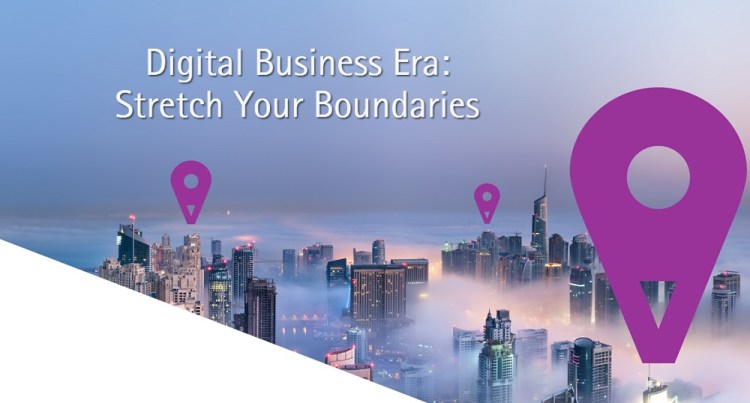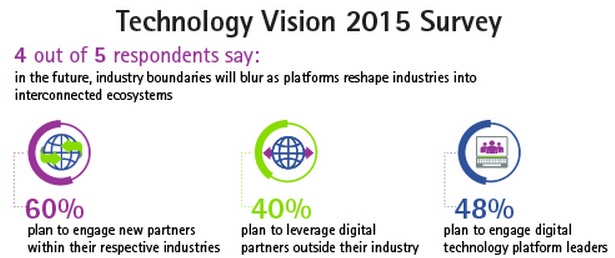Global consulting company Accenture offers a lot of advice to its customers about important business trends, so the company has to stay up to speed on technology. And that’s why it’s revealing its five big tech trends for 2015.
The Accenture Technology Vision 2015 says that every business is now a digital business. Companies are leveraging social, mobile, analytics, and cloud to transform their enterprises into digital businesses. Now the challenge is what will business leaders do with their digital advantages, Accenture said. A year ago, Accenture pushed industries to start using technology not just to improve their internal processes, but as a driving force for how they grow. This year, the company said enterprises are mastering the shift from “me to we.”
It noted that the Internet of Things, or making everyday objects smart and connected, is becoming a driving force in innovation. So is the idea of “digitizing every employee, process, product, and service.” Companies now routinely deal with hundreds of businesses processes, thousands of employees, and millions of consumers. And large companies are at a scale where they touch billions of lives. Those companies are becoming a part of huge digital ecosystems of networked companies and individuals.
“Visionary companies are recognizing that as every business becomes a digital business, together they can effect change on a much bigger stage,” Accenture said. Home Depot, for instance, is using the Internet of Things to shape the way people live in connected homes. Every product that it sells will have to be compatible with Home Depot’s own Wink connected home system, making all products in its ecosystem easier to install. Fiat plans to use its Uconnect platform — integrated with TomTom, Reuters, Facebook, and TuneIn — to provide drivers with communication, entertainment, and navigation that lets drivers stay focused on driving.
“By tapping into digital ecosystems, these companies have the ability to realize ambitions that transcend any single business or any one industry,” Accenture said.
Businesses are operating as ecosystems, not just individual corporate entities. They are making alliances so that they can build smart mega-cities of the future, remake transportation systems, and raise the quality of health care. The power brokers will be the master orchestrators that place themselves at the center of these digital ecosystems.
Accenture’s analysis is based on part in a survey of 2,000 information technology and business executives. In that survey, 60 percent of respondents said they plan to engage new partners in their industries, while 40 percent said they plan to find new digital partners outside their industry, and 48 percent said they plan to engage with digital technology platform leaders.
Here’s more details on the five big trends.
1. The Internet of Me. This means that our world will be personalized. Everyday objects are going online, creating an abundance of digital channels that reach deep into our lives. Forward-thinking businesses are changing the ways they build new applications, products, and services to engage customers without breaching the customers’ trust.
2. Outcome economy. Intelligent hardware will bridge the digital enterprise and the physical world. As the physical world picks up sensors of all kinds, products will become more meaningful in the results they produce for people. This is no longer about selling things, but selling results in the outcome economy.
3. Platform (R)evolution. Platform-based companies are capturing more of the digital economy’s opportunities for growth and profits. The cloud and mobility are eroding the tech and cost barriers associated with such platforms.
4. Intelligent enterprise. Tech will enable people to make faster decisions. With an influx of big data, software intelligence will make it easier for machines to make better informed decisions.
5. Workforce reimagined. Machines and humans have to be amplified to do more together. Advances in natural interfaces, wearable devices, and smart machines will present new chances for companies to empower their workers through technology.
It is a bit vague. But this is just the material from the beginning of a long white paper that Accenture is sharing with its customers in 120 countries. Accenture is a global management consulting firm with more than 305,000 employees offering management consulting, tech services, and outsourcing. Its revenues for the fiscal year ended Aug. 31, 2014 were $30 billion.
The vision was published by Accenture chief technology officer Paul Daugherty; Accenture technology R&D managing director Prith Banerjee; and Accenture Technology Vision managing director Michael Biltz.
VentureBeat's mission is to be a digital town square for technical decision-makers to gain knowledge about transformative enterprise technology and transact. Learn More


